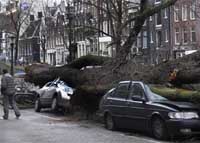Hurricane Cyrill hammers Europe, killing at least 30
Gale force winds and heavy downpours hammered northern Europe on Thursday, killing 27 people and disrupting travel for tens of thousands.

The storms were among the fiercest to batter northern Europe in years, ripping off part of the roof at Lord's Cricket Ground in London, toppling trucks on Europe's busiest highway and forcing trains in Germany and the Netherlands to a virtual standstill.
By evening, as wind speeds subsided, weather related accidents had killed 27 people, including a 2 year-old boy hit by falling brick from a crumpled wall in London.
Ten deaths were reported in the United Kingdom while seven people died in Germany, four in the Netherlands; three in the Czech Republic and two in Belgium and one in France.
U.S. Secretary of State Condoleezza Rice, meanwhile, cut short her visit to Berlin in order to leave for London before winds worsened, landing at London's Heathrow Airport amid winds gusting up to 130 kph (77 mph).
"It's not often you get winds of that sort of strength that far inland," said John Hammond, the spokesman for Britain's weather office. "(Rice) did well to land there, I wouldn't have fancied doing that."
German meteorologists dubbed the storm "Cyril" and recorded gusts of up to 191 kph (118 mph), forcing dozens of flight cancelations, prompting the national railroad to suspend services and shutting schools.
"We are still at a standstill nationwide," with only a few trains running, said Hans-Georg Zimmermann, the spokesman of the national railroad, Deutsche Bahn. In remarks on n-tv television, he said "significant" disruption could be expected on Friday when services resume.
At Berlin's central railway station, Luise Mazur Reinhold, 79, sat disconsolately on a station bench.
"What should we do now? They threw us off the train 10 minutes ago," said Mazur, from southern Poland, who had hoped to travel to Hamburg to celebrate her husband's 85th birthday with friends. "We had invited all these people to his 85th birthday, but now we just can't get there."
Traffic on the Eurostar, the train service connecting Britain with continental Europe, was suspended after an electrical cable holder fell onto the tracks near the northern French city of Lille, France's national railway company said.
In London, harried commuters struggled through a gauntlet of road closures caused by falling debris blown from glass-paneled office buildings and medieval churches. The city's slender Millennium Bridge was closed after the suspension structure began swaying dangerously in the wind.
Rail stations across London were closed. The evening commute melted into chaos.
"First the buses couldn't cross the bridge because of the wind, and now this," said Paul Richards, 26, a real estate agent attempting to reach London Bridge station.
He swore, and turned back to retrace his steps across the wind-swept bridge.
Traffic on the M-25 highway around London, the busiest in Europe, was backed up for miles (kilometers) after three trucks were knocked over by a single gust of wind at around 1300GMT.
Traffic accidents accounted for many of the fatalities, including one in Shropshire, England, where a 54-year-old man identified as Richard Heard, managing director of Birmingham Airport, died after his car ran into a fallen branch that pierced the windshield.
In Amsterdam, cyclists who ventured out despite warnings from the fire department were blown over or, in some cases, blown backward.
City workers trying to divert cars from fallen trees watched as the wind swept their traffic cones away. The fire department warned people to stay indoors to avoid falling roof tiles and branches, and the city's historic canals were littered with fallen trash barrels, piles of toppled bikes and dozens of broken umbrellas.
In Utrecht, Netherlands, a construction crane toppled onto a university building, crumpling the roof and injuring six.
In the northern Netherlands, authorities also patrolled dikes as they were battered by seas whipped up by the storm. There were no reports of dike breaches.
London's Heathrow Airport, Europe's largest, canceled 280 flights. Other major airports including Frankfurt, Munich, Amsterdam and Vienna reported delays and cancellations.
At sea, coast guard ships and naval helicopters rescued the crew of a British container ship damaged and drifting in the English Channel, Britain's Coast Guard said.
Ferries were canceled or delayed in Britain, Ireland, France, Belgium, the Netherlands and Finland.
In Ireland and Latvia, winds kept rescue crews from helping other ships damaged or missing after storms earlier this week: seven fishermen from Ireland, Poland and Ukraine are missing and presumed dead off Ireland's coast, while Latvian rescuers were unable to attempt to salvage a Greek-owned cargo ship that ran aground Tuesday off the Baltic port of Ventspils and has been leaking oil.
A ship burst loose from its moorings near Rotterdam and smashed an oil pipeline, leaking around 1,600 cubic meters (10,000 barrels) of oil. The stench reached The Hague, 30 kilometers (20 miles) away, Dutch media said.
On land, residents along the North Sea coast were warned to expect storm swells up to 3.5 meters (11.5 feet) higher than normal, reports AP.
Austria's national weather service said storm winds had the potential to reach 170 kph (105 mph) at higher altitudes in the Alps, and officials cautioned skiers and snowboarders to get off the mountains and seek shelter well before nightfall.
In western Austria, more than 20,000 homes were without electricity, the region's main power utility said Thursday night. Officials said the power outage forced the closure of at least one key motorway tunnel.
Subscribe to Pravda.Ru Telegram channel, Facebook, RSS!





